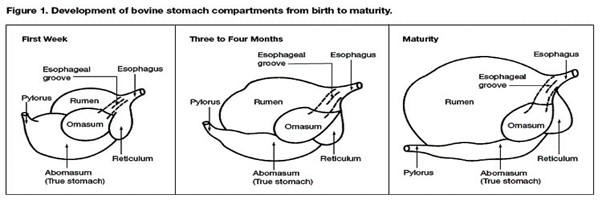Calf Rumen Development – The First Building Block
A newly born calf has the same digestive tract as a monogastric. The underdeveloped rumen allows nutrients such as milk proteins, lipids, and sugars to be utilised directly by the calf through the Esophageal Groove, which is made up of folds of muscle that runs to the abomasum. Within 10 minutes the milk curdles from the coagulation of milk proteins. Whey protein, lactose and minerals separate from the curd and move into the small intestine where the lactose is digested quickly to provide energy for the calf. Young calves find it difficult to digest and absorb plant proteins, therefore if feeding a milk replacer check the ash content in the replacer, which should not be greater than 17%, as this is the vegetable protein proportion of the powder. Calf nutrition practices to properly develop the calf rumen begins with the introduction of solid feeds. ntroducing dried palatable feed from as early as 3 days old will start this process. Through the production of volatile fatty acids which promote rumen development. The carbohydrates in cereals are a much better source of these end products. It is these end products which are responsible for rumen development rather than the physical bulk provided by forage. Introduce processed or chopped straw will also encourage rumen development. Calves will dip their noses into a container of chopped straw, which will then stick to the nose which in turn will be eaten when the nose is licked. The feed must be attractive and palatable for the calf so choose a nut that is no larger than 5 millimetres in diameter and length.
Calf nutrition practices to properly develop the calf rumen begins with the introduction of solid feeds. ntroducing dried palatable feed from as early as 3 days old will start this process. Through the production of volatile fatty acids which promote rumen development. The carbohydrates in cereals are a much better source of these end products. It is these end products which are responsible for rumen development rather than the physical bulk provided by forage. Introduce processed or chopped straw will also encourage rumen development. Calves will dip their noses into a container of chopped straw, which will then stick to the nose which in turn will be eaten when the nose is licked. The feed must be attractive and palatable for the calf so choose a nut that is no larger than 5 millimetres in diameter and length.
The goal of any calf nutrition program is to lay the groundwork in developing a calf to become an efficient feed converter and viable member of the herd. Understanding how the rumen develops and managing feed inputs to control this development can greatly affect this outcome and raise the potential of any ruminant.
Figure 1 below shows a great illustration on how the rumen develops from week one to maturity.
For help and advice on improving your Calf Management or Housing, please contact Mark
on 07984 785190 or e-mail markyearsley@fcgagric.com

Recent Articles
- Do You Know the Benefits of a Health and Heat Detection System?
- Have you Ordered Your Silage Inoculant?
- Growing More Grass With Less Nitrogen, Where Do I start?
- A Real Recognition of The Importance of Food Security or Simply A Reconciling of DEFRA Budgets?
- Silage Sheet Prices Available!
- Are Your Cows at Risk of Grass Staggers?
- Feed Late Afternoon and Calve in Daylight Hours!
- Q Fever
- Aerating Your Soil Without A Machine? – Gerard Finnan
- Why Are You Not doing a Soil Management Plan?

